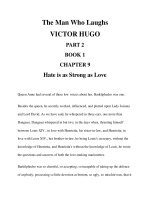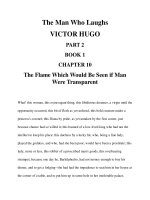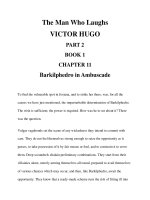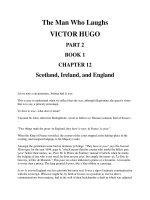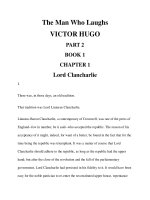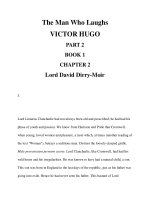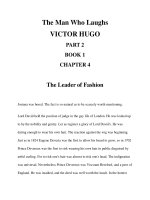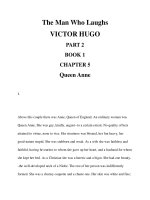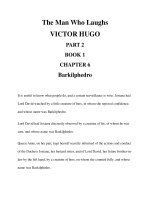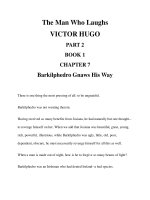The Man Who Laughs Victor Hugo Part 2 Book 7 Chapter 4 pot
Bạn đang xem bản rút gọn của tài liệu. Xem và tải ngay bản đầy đủ của tài liệu tại đây (45.46 KB, 17 trang )
The Man Who Laughs
Victor Hugo
Part 2
Book 7
Chapter 4
Satan
Suddenly the sleeper awoke. She sat up with a sudden and gracious dignity of
movement, her fair silken tresses falling in soft disorder. Then stretching
herself, she yawned like a tigress in the rising sun.
Perhaps Gwynplaine breathed heavily, as we do when we endeavour to restrain
our respiration.
"Is any one there?" said she.
She yawned as she spoke, and her very yawn was graceful. Gwynplaine listened
to the unfamiliar voice the voice of a charmer, its accents exquisitely haughty,
its caressing intonation softening its native arrogance. Then rising on her knees-
-there is an antique statue kneeling thus in the midst of a thousand transparent
folds she drew the dressing-gown towards her, and springing from the couch
stood upright. In the twinkling of an eye the silken robe was around her. The
trailing sleeve concealed her hands; only the tips of her toes, with little pink
nails like those of an infant, were left visible. Having drawn from underneath
the dressing-gown a mass of hair which had been imprisoned by it, she crossed
behind the couch to the end of the room, and placed her ear to the painted
mirror, which was, apparently, a door. Tapping the glass with her finger, she
called, "Is any one there? Lord David? Are you come already? What time is it
then? Is that you, Barkilphedro?" She turned from the glass. "No! it was not
there. Is there any one in the bathroom? Will you answer? Of course not. No
one could come that way."
Going to the silver lace curtain, she raised it with her foot, thrust it aside with
her shoulder, and entered the marble room. An agonized numbness fell upon
Gwynplaine. No possibility of concealment. It was too late to fly. Moreover, he
was no longer equal to the exertion. He wished that the earth might open and
swallow him up. Anything to hide him.
She saw him. She stared, immensely astonished, but without the slightest
nervousness. Then, in a tone of mingled pleasure and contempt, she said, "Why,
it is Gwynplaine!" Suddenly with a rapid spring, for this cat was a panther, she
flung herself on his neck.
Suddenly, pushing him back, and holding him by both shoulders with her small
claw-like hands, she stood up face to face with him, and began to gaze at him
with a strange expression.
It was a fatal glance she gave him with her Aldebaran-like eyes a glance at
once equivocal and starlike. Gwynplaine watched the blue eye and the black
eye, distracted by the double ray of heaven and of hell that shone in the orbs
thus fixed on him. The man and the woman threw a malign dazzling reflection
one on the other. Both were fascinated he by her beauty, she by his deformity.
Both were in a measure awe-stricken. Pressed down, as by an overwhelming
weight, he was speechless.
"Oh!" she cried. "How clever you are! You are come. You found out that I was
obliged to leave London. You followed me. That was right. Your being here
proves you to be a wonder."
The simultaneous return of self-possession acts like a flash of lightning.
Gwynplaine, indistinctly warned by a vague, rude, but honest misgiving, drew
back, but the pink nails clung to his shoulders and restrained him. Some
inexorable power proclaimed its sway over him. He himself, a wild beast, was
caged in a wild beast's den. She continued, "Anne, the fool you know whom I
mean the queen ordered me to Windsor without giving any reason. When I
arrived she was closeted with her idiot of a Chancellor. But how did you
contrive to obtain access to me? That's what I call being a man. Obstacles,
indeed! there are no such things. You come at a call. You found things out. My
name, the Duchess Josiana, you knew, I fancy. Who was it brought you in? No
doubt it was the page. Oh, he is clever! I will give him a hundred guineas.
Which way did you get in? Tell me! No, don't tell me; I don't want to know.
Explanations diminish interest. I prefer the marvellous, and you are hideous
enough to be wonderful. You have fallen from the highest heavens, or you have
risen from the depths of hell through the devil's trap-door. Nothing can be more
natural. The ceiling opened or the floor yawned. A descent in a cloud, or an
ascent in a mass of fire and brimstone, that is how you have travelled. You have
a right to enter like the gods. Agreed; you are my lover."
Gwynplaine was scared, and listened, his mind growing more irresolute every
moment. Now all was certain. Impossible to have any further doubt. That letter!
the woman confirmed its meaning. Gwynplaine the lover and the beloved of a
duchess! Mighty pride, with its thousand baleful heads, stirred his wretched
heart. Vanity, that powerful agent within us, works us measureless evil.
The duchess went on, "Since you are here, it is so decreed. I ask nothing more.
There is some one on high, or in hell, who brings us together. The betrothal of
Styx and Aurora! Unbridled ceremonies beyond all laws! The very day I first
saw you I said, 'It is he!' I recognize him. He is the monster of my dreams. He
shall be mine. We should give destiny a helping hand. Therefore I wrote to you.
One question, Gwynplaine: do you believe in predestination? For my part, I
have believed in it since I read, in Cicero, Scipio's dream. Ah! I did not observe
it. Dressed like a gentleman! You in fine clothes! Why not? You are a
mountebank. All the more reason. A juggler is as good as a lord. Moreover,
what are lords? Clowns. You have a noble figure; you are magnificently made.
It is wonderful that you should be here. When did you arrive? How long have
you been here? Did you see me naked? I am beautiful, am I not? I was going to
take my bath. Oh, how I love you! You read my letter! Did you read it yourself?
Did any one read it to you? Can you read? Probably you are ignorant. I ask
questions, but don't answer them. I don't like the sound of your voice. It is soft.
An extraordinary thing like you should snarl, and not speak. You sing
harmoniously. I hate it. It is the only thing about you that I do not like. All the
rest is terrible is grand. In India you would be a god. Were you born with that
frightful laugh on your face? No! No doubt it is a penal brand. I do hope you
have committed some crime. Come to my arms."
She sank on the couch, and made him sit beside her. They found themselves
close together unconsciously. What she said passed over Gwynplaine like a
mighty storm. He hardly understood the meaning of her whirlwind of words.
Her eyes were full of admiration. She spoke tumultuously, frantically, with a
voice broken and tender. Her words were music, but their music was to
Gwynplaine as a hurricane. Again she fixed her gaze upon him and continued,
"I feel degraded in your presence, and oh, what happiness that is! How insipid it
is to be a grandee! I am noble; what can be more tiresome? Disgrace is a
comfort. I am so satiated with respect that I long for contempt. We are all a little
erratic, from Venus, Cleopatra, Mesdames de Chevreuse and de Longueville,
down to myself. I will make a display of you, I declare. Here's a love affair
which will be a blow to my family, the Stuarts. Ah! I breathe again. I have
discovered a secret. I am clear of royalty. To be free from its trammels is indeed
deliverance. To break down, defy, make and destroy at will, that is true
enjoyment. Listen, I love you."
She paused; then with a frightful smile went on, "I love you, not only because
you are deformed, but because you are low. I love monsters, and I love
mountebanks. A lover despised, mocked, grotesque, hideous, exposed to
laughter on that pillory called a theatre, has for me an extraordinary attraction. It
is tasting the fruit of hell. An infamous lover, how exquisite! To taste the apple,
not of Paradise, but of hell such is my temptation. It is for that I hunger and
thirst. I am that Eve, the Eve of the depths. Probably you are, unknown to
yourself, a devil. I am in love with a nightmare. You are a moving puppet, of
which the strings are pulled by a spectre. You are the incarnation of infernal
mirth. You are the master I require. I wanted a lover such as those of Medea and
Canidia. I felt sure that some night would bring me such a one. You are all that I
want. I am talking of a heap of things of which you probably know nothing.
Gwynplaine, hitherto I have remained untouched; I give myself to you, pure as a
burning ember. You evidently do not believe me; but if you only knew how
little I care!"
Her words flowed like a volcanic eruption. Pierce Mount Etna, and you may
obtain some idea of that jet of fiery eloquence.
Gwynplaine stammered, "Madame "
She placed her hand on his mouth. "Silence," she said. "I am studying you. I am
unbridled desire, immaculate. I am a vestal bacchante. No man has known me,
and I might be the virgin pythoness at Delphos, and have under my naked foot
the bronze tripod, where the priests lean their elbows on the skin of the python,
whispering questions to the invisible god. My heart is of stone, but it is like
those mysterious pebbles which the sea washes to the foot of the rock called
Huntly Nabb, at the mouth of the Tees, and which if broken are found to contain
a serpent. That serpent is my love a love which is all-powerful, for it has
brought you to me. An impossible distance was between us. I was in Sirius, and
you were in Allioth. You have crossed the immeasurable space, and here you
are. 'Tis well. Be silent. Take me."
She ceased; he trembled. Then she went on, smiling, "You see, Gwynplaine, to
dream is to create; to desire is to summon. To build up the chimera is to provoke
the reality. The all-powerful and terrible mystery will not be defied. It produces
result. You are here. Do I dare to lose caste? Yes. Do I dare to be your mistress-
-your concubine your slave your chattel? Joyfully. Gwynplaine, I am woman.
Woman is clay longing to become mire. I want to despise myself. That lends a
zest to pride. The alloy of greatness is baseness. They combine in perfection.
Despise me, you who are despised. Nothing can be better. Degradation on
degradation. What joy! I pluck the double blossom of ignominy. Trample me
under foot. You will only love me the more. I am sure of it. Do you understand
why I idolize you? Because I despise you. You are so immeasurably below me
that I place you on an altar. Bring the highest and lowest depths together, and
you have Chaos, and I delight in Chaos Chaos, the beginning and end of
everything. What is Chaos? A huge blot. Out of that blot God made light, and
out of that sink the world. You don't know how perverse I can be. Knead a star
in mud, and you will have my likeness."
She went on,
"A wolf to all beside; a faithful dog to you. How astonished they will all be!
The astonishment of fools is amusing. I understand myself. Am I a goddess?
Amphitrite gave herself to the Cyclops. Fluctivoma Amphitrite. Am I a fairy?
Urgele gave herself to Bugryx, a winged man, with eight webbed hands. Am I a
princess? Marie Stuart had Rizzio. Three beauties, three monsters. I am greater
than they, for you are lower than they. Gwynplaine, we were made for one
another. The monster that you are outwardly, I am within. Thence my love for
you. A caprice? Just so. What is a hurricane but a caprice? Our stars have a
certain affinity. Together we are things of night you in your face, I in my mind.
As your countenance is defaced, so is my mind. You, in your turn, create me.
You come, and my real soul shows itself. I did not know it. It is astonishing.
Your coming has evoked the hydra in me, who am a goddess. You reveal my
real nature. See how I resemble you. Look at me as if I were a mirror. Your face
is my mind. I did not know I was so terrible. I am also, then, a monster. O
Gwynplaine, you do amuse me!"
She laughed, a strange and childlike laugh; and, putting her mouth close to his
ear, whispered,
"Do you want to see a mad woman? look at me."
She poured her searching look into Gwynplaine. A look is a philtre. Her
loosened robe provoked a thousand dangerous feelings. Blind, animal ecstasy
was invading his mind ecstasy combined with agony. Whilst she spoke, though
he felt her words like burning coals, his blood froze within his veins. He had not
strength to utter a word.
She stopped, and looked at him.
"O monster!" she cried. She grew wild.
Suddenly she seized his hands.
"Gwynplaine, I am the throne; you are the footstool. Let us join on the same
level. Oh, how happy I am in my fall! I wish all the world could know how
abject I am become. It would bow down all the lower. The more man abhors,
the more does he cringe. It is human nature. Hostile, but reptile; dragon, but
worm. Oh, I am as depraved as are the gods! They can never say that I am not a
king's bastard. I act like a queen. Who was Rodope but a queen loving Pteh, a
man with a crocodile's head? She raised the third pyramid in his honour.
Penthesilea loved the centaur, who, being now a star, is named Sagittarius. And
what do you say about Anne of Austria? Mazarin was ugly enough! Now, you
are not only ugly; you are deformed. Ugliness is mean, deformity is grand.
Ugliness is the devil's grin behind beauty; deformity is the reverse of sublimity.
It is the back view. Olympus has two aspects. One, by day, shows Apollo; the
other, by night, shows Polyphemus. You you are a Titan. You would be
Behemoth in the forests, Leviathan in the deep, and Typhon in the sewer. You
surpass everything. There is the trace of lightning in your deformity; your face
has been battered by the thunderbolt. The jagged contortion of forked lightning
has imprinted its mark on your face. It struck you and passed on. A mighty and
mysterious wrath has, in a fit of passion, cemented your spirit in a terrible and
superhuman form. Hell is a penal furnace, where the iron called Fatality is
raised to a white heat. You have been branded with it. To love you is to
understand grandeur. I enjoy that triumph. To be in love with Apollo a fine
effort, forsooth! Glory is to be measured by the astonishment it creates. I love
you. I have dreamt of you night after night. This is my palace. You shall see my
gardens. There are fresh springs under the shrubs; arbours for lovers; and
beautiful groups of marble statuary by Bernini. Flowers! there are too many
during the spring the place is on fire with roses. Did I tell you that the queen is
my sister? Do what you like with me. I am made for Jupiter to kiss my feet, and
for Satan to spit in my face. Are you of any religion? I am a Papist. My father,
James II., died in France, surrounded by Jesuits. I have never felt before as I feel
now that I am near you. Oh, how I should like to pass the evening with you, in
the midst of music, both reclining on the same cushion, under a purple awning,
in a gilded gondola on the soft expanse of ocean! Insult me, beat me, kick me,
cuff me, treat me like a brute! I adore you."
Caresses can roar. If you doubt it, observe the lion's. The woman was horrible,
and yet full of grace. The effect was tragic. First he felt the claw, then the velvet
of the paw. A feline attack, made up of advances and retreats. There was death
as well as sport in this game of come and go. She idolized him, but arrogantly.
The result was contagious frenzy. Fatal language, at once inexpressible, violent,
and sweet. The insulter did not insult; the adorer outraged the object of
adoration. She, who buffeted, deified him. Her tones imparted to her violent yet
amorous words an indescribable Promethean grandeur. According to Æschylus,
in the orgies in honour of the great goddess the women were smitten by this evil
frenzy when they pursued the satyrs under the stars. Such paroxysms raged in
the mysterious dances in the grove of Dodona. This woman was as if
transfigured if, indeed, we can term that transfiguration which is the antithesis
of heaven.
Her hair quivered like a mane; her robe opened and closed. The sunshine of the
blue eye mingled with the fire of the black one. She was unearthly.
Gwynplaine, giving way, felt himself vanquished by the deep subtilty of this
attack.
"I love you!" she cried. And she bit him with a kiss.
Homeric clouds were, perhaps, about to be required to encompass Gwynplaine
and Josiana, as they did Jupiter and Juno. For Gwynplaine to be loved by a
woman who could see and who saw him, to feel on his deformed mouth the
pressure of divine lips, was exquisite and maddening. Before this woman, full of
enigmas, all else faded away in his mind. The remembrance of Dea struggled in
the shadows with weak cries. There is an antique bas-relief representing the
Sphinx devouring a Cupid. The wings of the sweet celestial are bleeding
between the fierce, grinning fangs.
Did Gwynplaine love this woman? Has man, like the globe, two poles? Are we,
on our inflexible axis, a moving sphere, a star when seen from afar, mud when
seen more closely, in which night alternates with day? Has the heart two
aspects one on which its love is poured forth in light; the other in darkness?
Here a woman of light, there a woman of the sewer. Angels are necessary. Is it
possible that demons are also essential? Has the soul the wings of the bat? Does
twilight fall fatally for all? Is sin an integral and inevitable part of our destiny?
Must we accept evil as part and portion of our whole? Do we inherit sin as a
debt? What awful subjects for thought!
Yet a voice tells us that weakness is a crime. Gwynplaine's feelings are not to be
described. The flesh, life, terror, lust, an overwhelming intoxication of spirit,
and all the shame possible to pride. Was he about to succumb?
She repeated, "I love you!" and flung her frenzied arms around him.
Gwynplaine panted.
Suddenly close at hand there rang, clear and distinct, a little bell. It was the little
bell inside the wall. The duchess, turning her head, said,
"What does she want of me?"
Quickly, with the noise of a spring door, the silver panel, with the golden crown
chased on it, opened. A compartment of a shaft, lined with royal blue velvet,
appeared, and on a golden salver a letter. The letter, broad and weighty, was
placed so as to exhibit the seal, which was a large impression in red wax. The
bell continued to tinkle. The open panel almost touched the couch where the
duchess and Gwynplaine were sitting.
Leaning over, but still keeping her arm round his neck, she took the letter from
the plate, and touched the panel. The compartment closed in, and the bell ceased
ringing.
The duchess broke the seal, and, opening the envelope, drew out two documents
contained therein, and flung it on the floor at Gwynplaine's feet. The impression
of the broken seal was still decipherable, and Gwynplaine could distinguish a
royal crown over the initial A. The torn envelope lay open before him, so that he
could read, "To Her Grace the Duchess Josiana." The envelope had contained
both vellum and parchment. The former was a small, the latter a large
document. On the parchment was a large Chancery seal in green wax, called
Lords' sealing-wax.
The face of the duchess, whose bosom was palpitating, and whose eyes were
swimming with passion, became overspread with a slight expression of
dissatisfaction.
"Ah!" she said. "What does she send me? A lot of papers! What a spoil-sport
that woman is!"
Pushing aside the parchment, she opened the vellum.
"It is her handwriting. It is my sister's hand. It is quite provoking. Gwynplaine, I
asked you if you could read. Can you?"
Gwynplaine nodded assent.
She stretched herself at full length on the couch, carefully drew her feet and
arms under her robe, with a whimsical affectation of modesty, and, giving
Gwynplaine the vellum, watched him with an impassioned look.
"Well, you are mine. Begin your duties, my beloved. Read me what the queen
writes."
Gwynplaine took the vellum, unfolded it, and, in a voice tremulous with many
emotions, began to read:
"MADAM, We are graciously pleased to send to you herewith, sealed and
signed by our trusty and well-beloved William Cowper, Lord High Chancellor
of England, a copy of a report showing forth the very important fact that the
legitimate son of Linnæus Lord Clancharlie has just been discovered and
recognized, bearing the name of Gwynplaine, in the lowest rank of a wandering
and vagabond life, among strollers and mountebanks. His false position dates
from his earliest days. In accordance with the laws of the country, and in virtue
of his hereditary rights, Lord Fermain Clancharlie, son of Lord Linnæus, will be
this day admitted, and installed in his position in the House of Lords. Therefore,
having regard to your welfare, and wishing to preserve for your use the property
and estates of Lord Clancharlie of Hunkerville, we substitute him in the place of
Lord David Dirry-Moir, and recommend him to your good graces. We have
caused Lord Fermain to be conducted to Corleone Lodge. We will and
command, as sister and as Queen, that the said Fermain Lord Clancharlie,
hitherto called Gwynplaine, shall be your husband, and that you shall marry
him. Such is our royal pleasure."
While Gwynplaine, in tremulous tones which varied at almost every word, was
reading the document, the duchess, half risen from the couch, listened with
fixed attention. When Gwynplaine finished, she snatched the letter from his
hands.
"Anne R," she murmured in a tone of abstraction. Then picking up from the
floor the parchment she had thrown down, she ran her eye over it. It was the
confession of the shipwrecked crew of the Matutina, embodied in a report
signed by the sheriff of Southwark and by the lord chancellor.
Having perused the report, she read the queen's letter over again. Then she said,
"Be it so." And calmly pointing with her finger to the door of the gallery
through which he had entered, she added, "Begone."
Gwynplaine was petrified, and remained immovable. She repeated, in icy tones,
"Since you are my husband, begone." Gwynplaine, speechless, and with eyes
downcast like a criminal, remained motionless. She added, "You have no right
to be here; it is my lover's place." Gwynplaine was like a man transfixed. "Very
well," said she; "I must go myself. So you are my husband. Nothing can be
better. I hate you." She rose, and with an indescribably haughty gesture of adieu
left the room. The curtain in the doorway of the gallery fell behind her.
